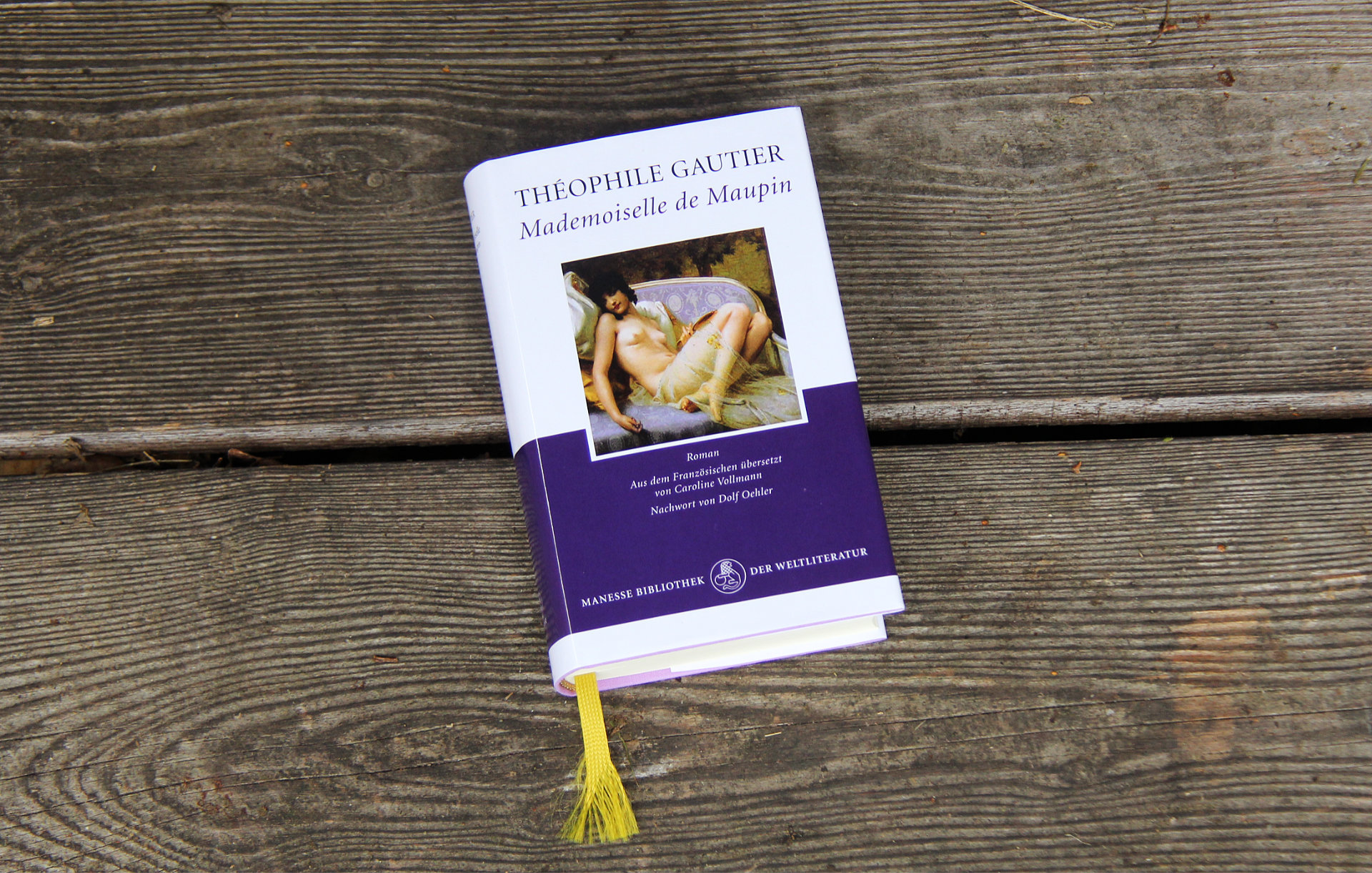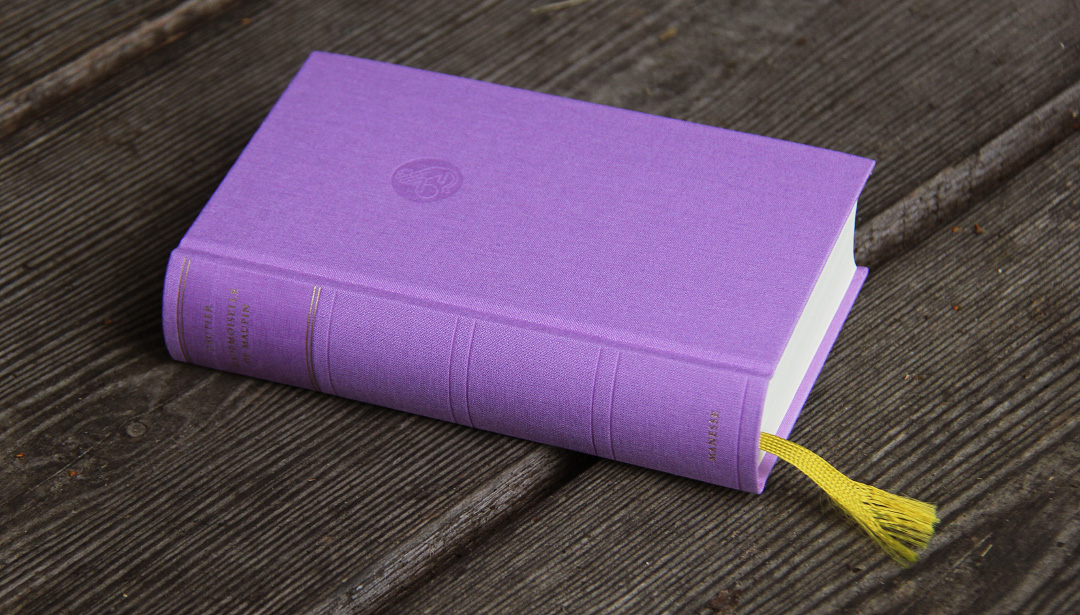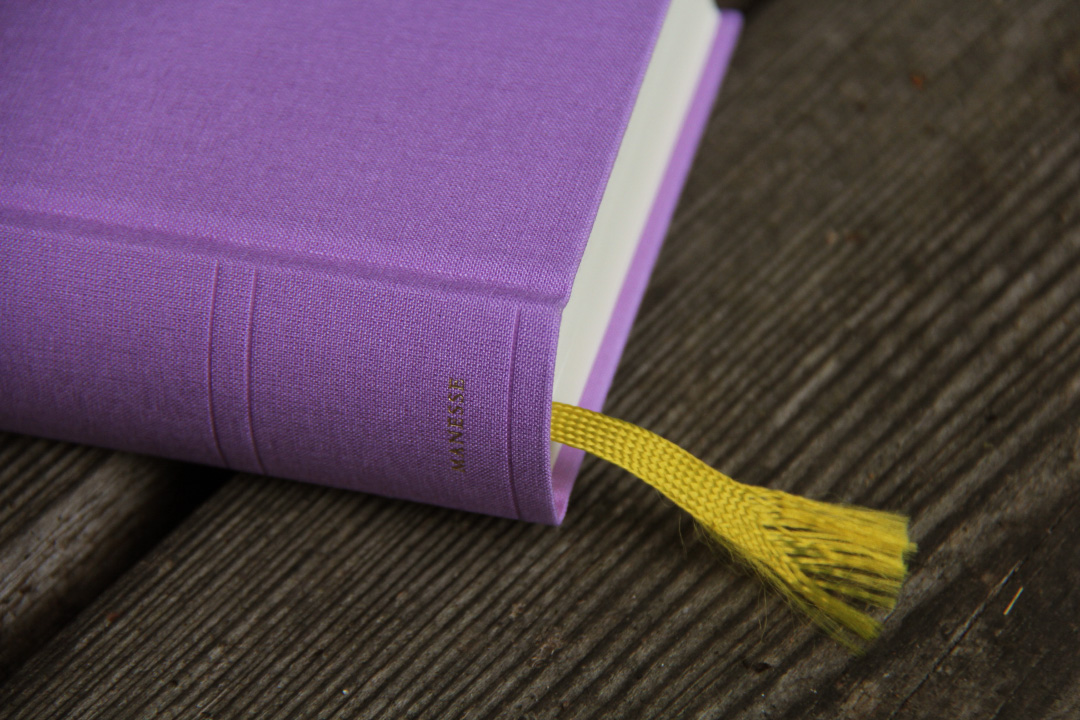Mademoiselle de Maupin • Théophile Gautier

In recent months, I’ve been treading very safe paths when it comes to my choice of literature. Primarily, I’ve been reading well-established classics where it was clear from the outset that I could hardly go wrong. The Manesse Verlag publishing program is an inexhaustible source for exactly such high-quality books. And if the book happens to be by a Romantic writer from Victor Hugo’s circle, my curiosity is naturally aroused. The blurb, which also promises a degree of sensual freedom, fully convinced me. The book sounded like another fast-paced story in the style of the French writers of that era.
The book begins with a seventy-page preface in which Gautier thoroughly rails against the morals of his time and defends freedom and sensual pleasures. He also takes aim at the newspapers and the feuilleton, criticizing them in great detail—sometimes crudely, sometimes entertainingly. Overall, the preface was rather lengthy, but it did increase my anticipation for the actual story. If the author starts with such a preface, something must surely be coming.

The story begins as an epistolary novel—a narrative style the book maintains almost throughout, with only a few chapters deviating into an omniscient point of view. At the beginning, the young nobleman D’Albert writes to a good friend about his life, which primarily consists of searching for the perfect lover. D’Albert’s desires and ideals, his way of life, his inner attitude toward love, beauty, and the arts are explored in great detail. Gautier goes deep into these reflections, and it quickly becomes clear that the author is expressing his own views through his protagonist’s voice. The young nobleman is not particularly likable; he spends his days imagining Mrs. Perfect as an ideal and lamenting that she doesn’t simply appear and throw herself into his arms. The image of the perfect woman he constructs fits the standards of his time, but from a modern perspective, D’Albert comes across as quite unsympathetic. That is likely intentional—and deliberately provocative. She should be rich, since poor women could never be beautiful to him, adorned like a statue, flawless in body, and, of course, stylishly dressed.
The central themes of the novel are love, beauty, aesthetics, and the roles of the sexes with their respective advantages and disadvantages. Gautier always remains focused on the tangible, on the surface, and as a reader, I couldn’t sympathize with any of the characters. I didn’t feel for them or identify with them, because all of them came across as superficial. D’Albert’s inner conflicts have something decadent about them. Mademoiselle de Maupin, who appears rather late in the book, was different; her letters are where the story finally becomes engaging. Here, Gautier employs disguise—a device that has worked wonderfully in many novels. A confusing love triangle unfolds, questioning gender roles while also touching on homosexual tendencies and offering a disillusioned, calculated view of beauty, love, and the physical. The note in the afterword mentioning that Flaubert’s later Madame Bovary caused a much greater stir than this book is indeed remarkable.
The text is pleasant to read and rich with references to myths, literature, and other texts. Gautier cleverly links his characters to Shakespeare’s As You Like It, which I found very well composed, as the figures in Shakespeare’s play truly have their counterparts in Gautier’s story, and vice versa. At the same time, the book is very much written in the Romantic style. I enjoyed that in many places, but at times I also found it too verbose, too detailed, too exaggerated. As I read, I kept wavering between admiration and irritation. One passage that I particularly liked, precisely because it is so overblown and theatrical, I’d like to quote here as an example:
“O Rosalinde! I love you, I adore you; why is there no stronger expression for it! I have always loved only you, always adored only you; I throw myself at your feet, I perish for you, and I would force all of creation to kneel before my idol; you are to me more than all of nature, more than myself, more than God; I am truly astonished that God does not descend from heaven to become your slave. Where you are not, all is desolate, all is dead, all is dark; you alone populate the world for me; you are life, the sun—you are everything.” (p. 480)
I wonder if one could still win someone over with such a love letter today. It certainly had style, without question. At the same time, Gautier scatters many fine thoughts and witty aphorisms throughout his writing, which are quite entertaining.
“[…]for pride leaves the heart the moment love enters it[…]” (p. 469)
It is precisely this kind of language that was, and still is, highly praised, and the afterword quotes a critic who found in this book the full splendor of the beautiful French language. Compared to other authors of the time, such as the Realists, I found the linguistic quality remarkable. Yet I missed a context in which such language could truly unfold its power. When I think of Balzac, he touched on the great questions of society and the human soul. In his work, such sentences have a very different effect on me—especially when I can deeply empathize with the characters. In Gautier’s circle, however, were indeed the great authors such as Victor Hugo and Honoré de Balzac, who recognized and valued his talent.
So who is Mademoiselle de Maupin? She was a historical figure, Julie d’Aubigny (married name Maupin), who lived around 1700 and ran away with her fencing master. She apparently led quite an eventful life—fought duels, dressed in men’s clothing, was convicted, fled to Brussels, became the lover of Count Albert of Bavaria, and experienced much more. Naturally, this might raise expectations of finding an adventure novel in the style of Dumas, which this book definitely is not. But drawing inspiration from the historical Maupin, Gautier certainly created his heroine in her image, even if the focus is not on adventure and scandal.

The Manesse Verlag edition is once again a delight to behold. With numerous annotations and an interesting afterword, it offers everything one could wish for. The lilac-pink linen binding fits the content perfectly. This is a compact and beautiful book that I enjoyed holding in my hands for the sheer pleasure of its physical form.
Conclusion: Reading Mademoiselle de Maupin left me with mixed feelings. I greatly enjoyed the poetic sentences and the story itself. The elements of disguise and confusion in this love triangle become very entertaining halfway through, and the story gains momentum in the final third. However, the superficially drawn characters, the often verbose and overly elaborate style, and the strong focus on physical beauty—at the expense of broader social and human questions—repeatedly bothered me. I did not find the characters particularly realistic. Still, I can certainly recommend reading it, as Gautier packs many reflections and beautiful sentences into an intriguing love story.
Book information: Mademoiselle de Maupin • Théophile Gautier • Manesse Verlag • 704 pages • ISBN 9783717522645

Hallo Tobi,
immer wieder spannend, zu entdecken, was für bekannte und weniger bekannte Klassiker du uns hier vorstellst.
Deine Kritikpunkte kann ich sehr gut verstehen und der Schwerpunkt auf Äußerlichkeiten und andere Oberflächlichkeiten des Lebens hätte mich nie zum Kauf bewogen. Der Hinweis auf die Anspielungen zum Shakespeare-Stück weckte dann aber doch mein Interesse, das Buch im Hinterkopf zu behalten und mir die Leseprobe zu Gemüte zu führen.
Ich glaube fast, dank dir wird der Verlag noch so manches Buch mehr verkaufen – so viele Verlagsschätze, wie du hier präsentierst. ;)
Viele Grüße
Kathrin
Liebe Kathrin,
wahrscheinlich ist mein Urteil zu streng und ich hab die ganzen Feinheiten in den Ausführungen von D’Albert einfach nicht wahrgenommen. Natürlich ist der Stil des Buches schon sehr schön. Verglichen mit beispielsweise “Auferstehung” (weil das grad aktuell ist), hat mich dieses Buch recht unberührt zurückgelassen.
Der Manesse Verlag hat schon sehr geniale Bücher im Programm. Meine Liste ist auch noch lange, was ich mir noch von dem Verlag kaufen will. Das hätten die auch echt verdient, wenn sie ordentlich was verdienen. Das sind schon schöne Schätze ;)
Liebe Grüße
Tobi
Hmmm, klingt interessant … Was meinste, ist das was für mich? Kennst ja meinen Geschmack : )
Liebe Grüße
Petra
Liebe Petra,
hmmm, das ist echt schwer einzuschätzen. Aber ich könnte mir vorstellen, dass es dir bei der Lektüre ähnlich gehen würde: Schöne Sätze aber von den Charakteren und Story her etwas zu wenig. Sich bin ich mir aber nicht. Also verlass dich lieber nicht auf mich, ich lieg bei mir ja schon immer wieder daneben ;)
Heute habe ich übrigens mir deine Lesung aus Deinem neuen Buch angehört. Hört sich ja sehr interessant an und du hättest echt die Stimme um das als Hörbuch vorzulesen. Sehr angenehm! Auf jeden Fall ist meine Wunschliste gewachsen und bald ist mal wieder Zeit für eine große Bestellung ;)
Liebe Grüße
Tobi